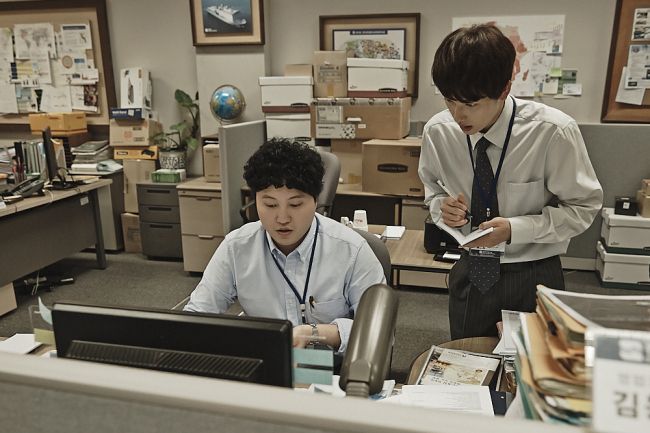[Weekender] Alternative content draws younger viewers
From ‘Misaeng’ to ‘Grandpas over Flowers,’ cable TV shows set trends
By Claire LeePublished : Dec. 19, 2014 - 21:52

“I could relate to the characters instantly because I am just as overworked as they are,” he said about the popular show, which is about the everyday lives of office workers at a competition-driven trading company.

“I loved how there is no romance for some lazy chaebol character who never works but worries about his girl problems 24/7.”
Experts say the rise of cable channels ― which is posing a threat to the long-dominance of the nation’s three big public broadcasters, MBC, KBS and SBS ― has to do with serving the interests of the younger generation, especially those in their 20s and 30s. The results include a frank, late-night talk show about sex and dating (JTBC’s “Witch Hunt”), a travel show in which veteran actors face challenges in foreign countries (tvN’s “Grandpas over Flowers”) and a poignant tale of a young, struggling contract worker (tvN’s “Misaeng”).
“This is making the cable channels trendsetters,” said culture critic Lee Moon-won. “Trends and changes are inseparable. And those who bring changes to society are usually those who are young and those who desire and seek something different.”
Lee said that unlike public broadcasters, cable TV channels don’t have to “please everyone of every age group” and this has worked in their favor.
According to Lee, the largest demographic of viewers of public broadcasters’ drama series is women in their 40s and 50s, and this has resulted in a flourishing number of family dramas and romance or adultery flicks in the last 20 years.
“Many dramas by public broadcasters, especially family dramas, are based on the perspectives of those in their 50s and 60s,” he said.
“Those shows don’t really portray the unique, realistic challenges that are endured by those in their 20s and even 30s today. In many family dramas, young people are portrayed as ungrateful and spoiled, while the elderly are often portrayed as the wisest people in the house.”
Cable channel tvN’s travel show, “Grandpas over Flowers,” is a great example of understanding today’s young Korean viewers, including their perspectives, Lee said.
The show chronicles the travels of four veteran actors in their 70s as they visit countries including Taiwan, France and Spain. The men have different tastes and personalities; one complains about the heat, while another constantly takes pictures of the scenery and sends them to his dear wife.
“In one scene, the four actors hang out with Sunny, one of the members of popular girl group Girls’ Generation,” Lee said.
“And one of the actors asks her, ‘Does Soo-man pay you well?’ referring to Lee Soo-man, the entertainment mogul and head of SM Entertainment. I think many young viewers found it refreshing that these men call Lee Soo-man ― the man who produced so many of today’s K-pop stars ― by his given name. It connected today’s pop culture with these men in their 70s, who have been in the local entertainment industry for more than 50 years.”


Yoon Ha-young, a 30-year-old office worker in Seoul who enjoyed the show, shared a similar view. “The general notion is that the elderly are used to being guided or assisted by those who are younger,” she said.
“But it does not work like that anymore once they are alone in foreign countries. They are rarely put into such situations. So when they struggle to find their hotel from the airport in a foreign country, it’s not something that’s dramatic but it’s still entertaining. I think creating this unique situation faced by the characters (in their 70s) was the whole purpose of the show.”
Critic Ha Jae-geun, who also said the majority of drama series produced by the public broadcasters are about conventional romances, chaebol stories and adultery, said cable TV channels manage to bring more reality into their shows.
“I think ‘Misaeng’ is one of the best shows produced this year,” he said.
“I don’t think public broadcasters would choose to produce shows like ‘Misaeng’ that do not include any romance.”
Ha pointed out that even romance and adultery shows have an edge when cable channels make them. JTBC’s “Secret Love Affair,” about a successful middle-aged woman (played by Kim Hee-ae) who marries into a chabeol family and has an extramarital affair with a pianist in his 20s (Yoo Ah-in), is more than a simple love story, he said.
The show, which enjoyed both popularity and attention for its controversial subject matter, aired from March to May.
“No other TV drama series have dealt with chaebol families and their companies from such a critical angle as ‘Secret Love Affair,’” Ha said. “Most drama shows (by the public broadcasters) would depict highly romanticized chaebol characters as those who have it all ― wealthy, good-looking and even kind.”
In spite of the success of cable channels, both Ha and Lee said it was unlikely that the public broadcasters would become more like their threatening competitors.
“They are public broadcasters, after all,” Lee said.
“They can’t give up a certain group of people to please the other.”
By Claire Lee (dyc@heraldcorp.com)










![[Hello India] Hyundai Motor vows to boost 'clean mobility' in India](http://res.heraldm.com/phpwas/restmb_idxmake.php?idx=644&simg=/content/image/2024/04/25/20240425050672_0.jpg&u=)







